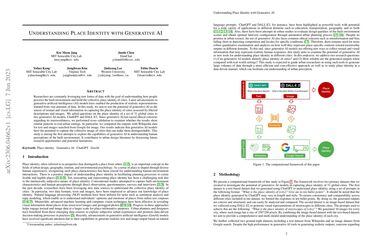Understanding Place Identity with Generative AI
Researchers are constantly leveraging new forms of data with the goal of understanding how people perceive the built environment and build the collective place identity of cities. Latest advancements in generative artificial intelligence (AI) models have enabled the production of realistic representations learned from vast amounts of data. In this study, we aim to test the potential of generative AI as the source of textual and visual information in capturing the place identity of cities assessed by filtered descriptions and images. We asked questions on the place identity of a set of 31 global cities to two generative AI models, ChatGPT and DALL-E2. Since generative AI has raised ethical concerns regarding its trustworthiness, we performed cross-validation to examine whether the results show similar patterns to real urban settings. In particular, we compared the outputs with Wikipedia data for text and images searched from Google for image. Our results indicate that generative AI models have the potential to capture the collective image of cities that can make them distinguishable. This study is among the first attempts to explore the capabilities of generative AI in understanding human perceptions of the built environment. It contributes to urban design literature by discussing future research opportunities and potential limitations.
PDF Abstract
 Perceptual Similarity
Perceptual Similarity